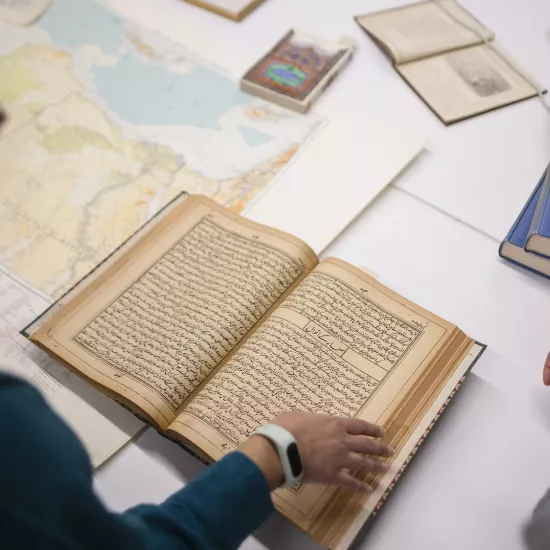UTM researchers awarded $1.4 million in federal funding

Professor Jessamyn Schertz is one of 16 University of Toronto Mississauga faculty members to receive a total of more than $1.4 million in grants from the Social Sciences and Humanities Research Council of Canada (SSHRC).
Regardless if it is "tomato" or "to-mah-to", pronunciations are of particular interest for Schertz, who works in the Department of Language Studies.
Her project, “Shifting Perception: How Listeners Adapt to a Multi-accented World,” recently received a funding boost of over $58,000 to examine how people comprehend speech and adapt to new speakers, particularly in linguistically diverse settings like the GTA, where listeners are exposed to a wide range of accents on a daily basis.
“As human listeners, we usually adjust to new speakers quickly and easily, but we do not have a good understanding of how we accomplish this,” says Schertz.
“This project will tease apart some of the underlying factors in accent adaptation in order to better understand the cognitive, linguistic, and experiential processes that work together to allow us to adjust to new speakers flexibly and efficiently. This will not only contribute to the discipline of linguistics and language processing, but will also be of value to the field of speech-recognition technology, systems such as Siri on an iPhone, which still face challenges when confronted with new or unusual accents,” says Schertz.
Schertz’s study will be conducted in Toronto and Mississippi and will focus on a range of native and non-native English accents commonly heard in the GTA. The funds, awarded through SSHRC’s latest Insight Development Grant (IDG) competition, will go towards data collection and analysis, dissemination of findings, and a research team including both graduate and undergraduate students over the course of the three-year project.
UTM’s Vice-Principal, Research, Professor Bryan Stewart, is thrilled and grateful to see this significant support of UTM research.
“We know that funding can be scarce for researchers and this remarkable influx of support will help our faculty members explore new ideas, generate data, and hire students to assist on these projects, as well as further inspire our vibrant scholarly community to build on excellent programs of research. It’s a great boost for our SSHRC-funded faculty” says Stewart.
Both SSHRC’s Insight and Partnership programs are funded annually. This year’s recipients were highlighted at Concordia University at an event held on November 15, where the Honourable Kirsty Duncan, Minister of Science, announced that the Government of Canada was committing over $265 million in funding for over 3,300 research projects in the social sciences and humanities across Canada.
“Our government is proud to support these talented researchers and scholars who are pushing the boundaries of knowledge to the benefit of Canadians and our growing middle class,” said Duncan.
Along with Schertz, the other eight IDG recipients at UTM listed as Principal Investigators (PI) include the following:
- Shelley Wall, Biomedical Communications/Department of Biology, for her project, “Time and Space in Graphic Narratives of Eldercare;”
- Natalie Bau, Department of Economics, for her project, “The Link Between Education and Female Genital Cutting;”
- Jasmine Rault, Institute of Communication, Culture, Information, and Technology, for her project, “Checking In: Building a Digital Research Ethics Collaboratory for Minor(itized) Materials;”
- Carrie Fulton, Department of Historical Studies, for her project, “Underwater Survey of a Late Bronze Age Anchorage at Maroni-Tsaroukkas, Cyprus,” also see the profile Deep Dive for more on Fulton’s work);
- Feng Chen, Department of Management, for his project, “Targeted Firms’ Strategic Financial Reporting Choices Against Patent Trolls;”
- Laura Derksen, Department of Management, for her project, “Internet Provision, Educational Outcomes and Social Networks;”
- Emily Impett, Department of Psychology, for her project, “Not in the Mood? A Conflict Negotiation Perspective on Sexual Rejection in Romantic Relationships;”
- Jennifer Stellar, Department of Psychology, for her project, “Awe a Key Collective Emotion: Understanding the Role of Awe in Group Membership and Intergroup Relations.”
The Insight Grant (IG) recipients were also announced in November. The SSHRC IGs support longer-term research initiatives anywhere from one to five years in duration, and with a value that can range from $7K to $400,000. The seven UTM faculty members named as PIs on SSHRC’s latest IG recipient list include the following:
- Mari Ruti, Department of English & Drama, for her project, “What’s Good About Feeling Bad: Affect, Theory, Queer Theory, and Rhetoric of Affliction;”
- Tenley Conway, Department of Geography, for her project, “Trees and Gardens are Infrastructure? Living Green Infrastructure and Urban Residents;”
- Mihaela Pirvulescu, Department of Language Studies, for her project, “Heritage language acquisition and maintenance in a trilingual context;”
- Tanjim Hossain, Department of Management, for his project, “Entry and Location Choice Games: Theoretical and Experimental Explorations;”
- Andreas Park, Department of Management, for his project, “FinTech, Blockchain, Distributed Ledgers, and Financial Market Trading;”
- Jennifer Nagel, Department of Philosophy, for her project, “Knowledge first, then belief: the emergence and application of core epistemic concepts;”
- Marleen Rozemond, Department of Philosophy, for her project, “Matter and its Limits in Early Modern Philosophy: Why Thought and Activity require immaterial beings.”
Additionally, UTM researchers were also funded through SSHRC’s Partnership Grant (PG) and Partnership Development Grant (PDG) programs:
- Laurel Besco of the Department of Geography and IMI and David Wolfe from the Department of Political Science are co-applicants on the PG project, “Greening Growth Partnership: Connecting Research with Policy for an Innovative, Sustainable Economy;” PI is Stewart Elgie from the University of Ottawa.
- Sonia Kang from the Institute for Management and Innovation (IMI) is a co-applicant on the PG project, “Engendering success in STEM: A Research Consortium for Gender Equality in Science and Technology;” PI is Tanya Schmader from the University of British Columbia.
- Tina Malti from the Department of Psychology is a collaborator on the PG project, “Child and Youth Refugee Research Coalition (CYRRC): Using Research to Inform Best Practices for Language, Literacy, Learning, Social Integration, and Child and Family Wellbeing;” PI is Michael Ungar from Dalhousie University.
- Christoph Emmrich from the Department of Historical Studies is a collaborator on the PDG project, “Expertise, Labour and Mobility in Nepals’ Post-Conflict, Post-Disaster Reconstruction: Construction, Law and Finance as Domains of Social Transformation;” PI is Sara Shneiderman from the University of British Columbia.
- Heather Miller is a collaborator on the PDG project, “Upper Indus petroglyphs and inscriptions in Northern Pakistan: A Partnership for Cultural Heritage Preservation and Promotion;” PI is Jason Neelis at Wilfrid Laurier University.
For a full list of all SSHRC grant recipients, see SSHRC’s website.



